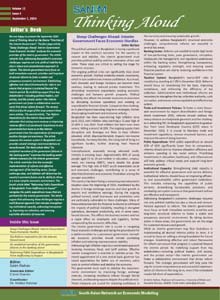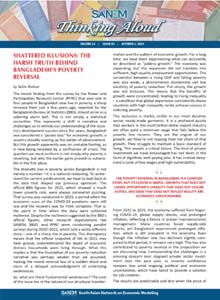
Thinking Aloud: Volume XI, Issue 4: September 1, 2024
 We are happy to present the September 2024 issue of Thinking Aloud on the theme “Priorities of the Interim Government”. The first page article, “Steep Challenges Ahead: Interim Government Faces Economic Hurdles” analyses the economic priorities of the interim government. The article remarks that, addressing Bangladesh’s economic challenges requires not only political stability but also a robust and comprehensive approach to reform. The interim government must focus on both immediate economic priorities and long-term structural reforms to foster a stable and prosperous economic environment. Establishing effective and robust frameworks for reform can ensure that progress is sustained beyond the interim period. By mobilizing support from key stakeholders—including political leaders, civil society, and the private sector—the interim government can foster a collaborative environment that drives reform forward. The second, third and fourth page of this issue present three more articles. The second article, “Tax Reform Imperatives for the Interim Government” reiterates that raising more revenue or improving revenue effort is of paramount importance to any government but more so on the interim government since the expectations of meaningful positive changes are enormous. The article assesses the revenue system in Bangladesh and provides several strategic recommendations to move forward. The third article titled “An analytical narrative of the governance failures in the banking sector” examines the banking sector reforms necessary for the interim government. The article concludes that the successful implementation of reforms and effective management of the banking sector, foreign exchange rates, and inflation will determine the country’s economic future and its ability to thrive in a more complex economic environment. The fourth article titled “Reforming Public Expenditure in Bangladesh: From Inefficiency to Impact” navigates the public expenditure issues that are pertinent for the interim government. The article argues that addressing these challenges requires a multi-faceted approach that includes strengthening institutional capacity, enhancing transparency, improving tax collection, and ensuring equitable allocation of resources.
We are happy to present the September 2024 issue of Thinking Aloud on the theme “Priorities of the Interim Government”. The first page article, “Steep Challenges Ahead: Interim Government Faces Economic Hurdles” analyses the economic priorities of the interim government. The article remarks that, addressing Bangladesh’s economic challenges requires not only political stability but also a robust and comprehensive approach to reform. The interim government must focus on both immediate economic priorities and long-term structural reforms to foster a stable and prosperous economic environment. Establishing effective and robust frameworks for reform can ensure that progress is sustained beyond the interim period. By mobilizing support from key stakeholders—including political leaders, civil society, and the private sector—the interim government can foster a collaborative environment that drives reform forward. The second, third and fourth page of this issue present three more articles. The second article, “Tax Reform Imperatives for the Interim Government” reiterates that raising more revenue or improving revenue effort is of paramount importance to any government but more so on the interim government since the expectations of meaningful positive changes are enormous. The article assesses the revenue system in Bangladesh and provides several strategic recommendations to move forward. The third article titled “An analytical narrative of the governance failures in the banking sector” examines the banking sector reforms necessary for the interim government. The article concludes that the successful implementation of reforms and effective management of the banking sector, foreign exchange rates, and inflation will determine the country’s economic future and its ability to thrive in a more complex economic environment. The fourth article titled “Reforming Public Expenditure in Bangladesh: From Inefficiency to Impact” navigates the public expenditure issues that are pertinent for the interim government. The article argues that addressing these challenges requires a multi-faceted approach that includes strengthening institutional capacity, enhancing transparency, improving tax collection, and ensuring equitable allocation of resources.



